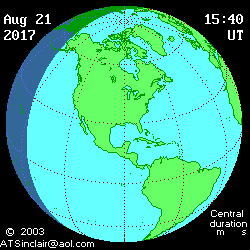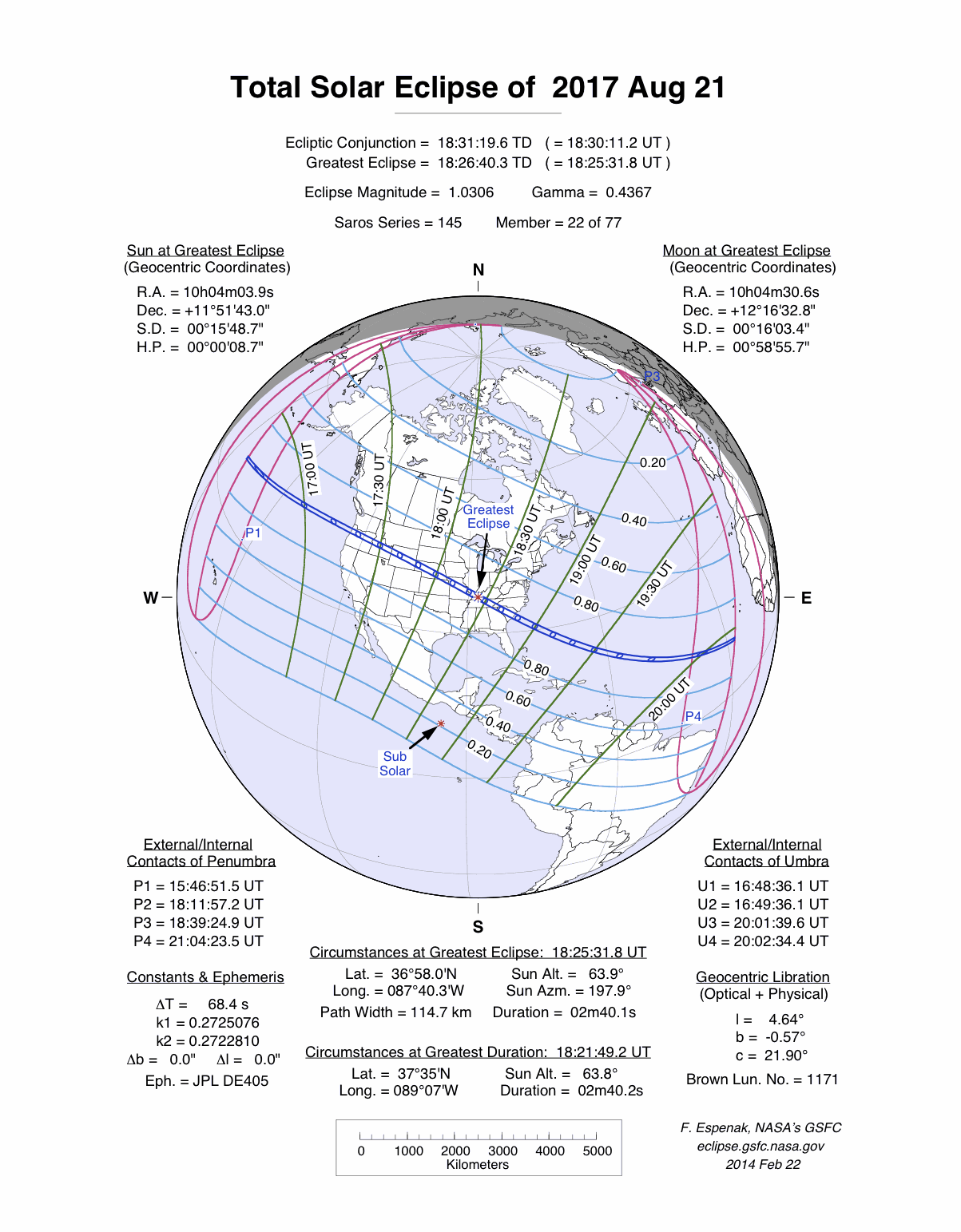Total Solar Eclipse August 21, 2017 in the United States

Often called the most extraordinary spectacle in nature, a total solar eclipse is an experience that will stay with you for a lifetime.
On a scale of 1 to 10, one famous eclipse watcher rated a partial solar eclipse as a 5, an annular solar eclipse as a 9 and a total solar eclipse as 1 million.
If you have a chance to see one, make sure you do.
Most total solar eclipses are in remote regions, often out in the ocean, as 75% of the planet is covered in water.
For the first time in decades, on August 21, 2017, a total solar eclipse will take place across
populated areas of the United States, entering in Oregon on the West Coast,
moving across the heartland of the United States, crossing many major cities,
and exiting from South Carolina on the East Coast.
It is rare for all these elements, an easily accessible location and the perfect time of year,
to come together so well at once, for an ideal solar eclipse viewing.
With the opportunity to tour around the country, during prime travel season,
people from all over the world will descend on the United States to see this spectacular show.
Make Your Reservations Now
This article is being first published on October 30, 2013, and at this time, four years in advance,
already reservations for hotels in the best viewing locations are filling up.
To view the total solar eclipse, you must be close to the absolute center line over which the eclipse travels.
Over about 150 miles away, you will not see the total eclipse at all.
If you are only over just a few dozen miles from this line, the duration of totality drops off quickly.
The 2017 total solar eclipse only lasts about 2 and a half minutes, so you want to be in position to see the
total eclipse for as long as possible.
In addition, you want to find a location where the weather is likely to have the least cloud cover.
Clouds often obscure eclipses.
On the day of the eclipse, there will be massive traffic trying to get to the best viewing locations.
If you are trying to travel to a viewing location on that day, you may get stuck on your way.
Savvy eclipse chasers know how far in advance you have to plan to get the best opportunity to see a total eclipse.
Japanese and German eclipse watchers, in addition to many in the US, have already reserved blocks of rooms in prime locations.
The best people that I know of thru whom to make your reservations are these people,
who have been organizing eclipse travel around the world for years.
Total and Annular Solar Eclipses of the Sun 1900 to 2059 in the Continental United States
Have you ever seen a total eclipse of the sun?
Here are the total and annular solar eclipses in the continental United States according to
NASA
since 1900 up to 2059.
- On March 30, 2052 a total eclipse crosses the Gulf Beaches from Southern Texas
across North Florida and Georgia.
- On August 12, 2045 a total eclipse crosses from Northern California,
through the center of the United States and down through Florida,
with area of greatest eclipse near Southern Florida.
- On April 8, 2024 a total eclipse crosses from Southern Texas through
the heart of the Midwest and exits through Maine, with time of greatest eclipse
just before entering Texas.
This is the next one to see.
- An annular eclipse of the sun crosses from the Northwestern United States
through Southern Texas on April 20, 2023.
- On August 21, 2017 a total eclipse enters the Northwestern United States
and exits around South Carolina, with time of greatest eclipse in Kentucky.
This is the one to prepare for now.
- On May 20, 2012 an annular eclipse enters the Northwestern United States
and ends at Lubbock, Texas.
- On May 10, 1994 an annular eclipse went diagonally across the United States
from Tucson, Arizona to Maine.
- On May 30, 1984 an annular eclipse went from New Orleans, Louisiana
to Washington, DC.
-
On Feburary 26, 1979 a total eclipse covered the North Western United States
border with Canada.
-
On March 7, 1970 a total eclipse crossed North Florida and went up the
Eastern United States seaboard.
If you have seen one, this was probably it.
-
A annular eclipse crossed Texas, the Gulf beaches, Florida and Southern Georgia
on April 7, 1940.
-
A hybrid (annular and total) eclipse angled across the Northwest United States
from California to Montana on April 28, 1930.
-
On September 10, 1923 a total eclipse clipped the coast of California with
the time of greatest eclipse near San Francisco and Los Angeles.
-
On June 8, 1918 a total eclipse of the sun went from Seattle, Washington
to Miami, Florida. This was the last total eclipse to cross the contintental United States.
-
June 28, 1908 an annular eclipse crossed Florida.
-
May 28, 1900 a total eclipse went through the heart of Dixie.
Path Across Continental United States for Total Solar Eclipse of 2017 August 21

Map of the Total Eclipse of the Sun on 2017 August 21 Across the Earth

Average August Afternoon Cloud Cover for Total Solar Eclipse of 2017 August 21

August 21, 2017 Total Solar Eclipse Resources
Solar Eclipse Resources
Stories of Total Eclipses
Feel free to send yours in to share.
We moved to Florida circa 1969.
There was a total eclipse on Saturday, March 7, 1970.
I was in the boy scouts at the time and there was a camping trip set up for that weekend at a place close to the path of the eclipse.
Everybody built those eclipse viewing boxes and such.
However, that weekend, one of my tasks to get some badge was to make a fire and cook my own food.
So I started to make my fire just before the eclipse began; it was a pathetic little 2 inch fire in a sandy pit.
Then the eclipse began very quickly.
All the day creatures stopped making noise and all the night creatures began; it was really dark!
Very scary!
And there I was, huddled over my puny fire hoping it would not go out.
The event lasted forever; about 3 minutes.
The fire never really got any bigger and I cooked a burger (which I dropped in the dirt), and ate it because I was hungry.
I do not recall, but it could have been my last scouting adventure.
~ Steve Wurgler